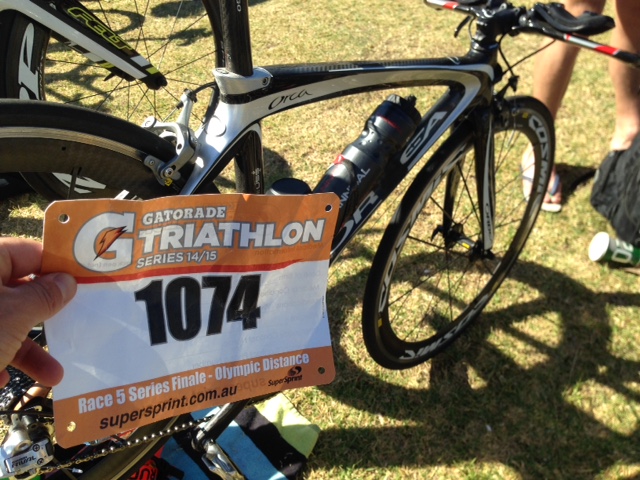
Several weeks ago, Rusty (my training buddy and brother from another mother) told me that his 16 year old son, Brandon has set a challenge for us. Can two washed up old triathletes get the better of him? We didn’t have to give it much thought, and eagerly accepted the challenge.
- The Race: Gatorade Triathlon Series – Race 5
- The Distance: 1500m swim, 40km ride, 10km run (Olympic Distance)
- The Venue: St Kilda, Melbourne
I was rather excited to give this one a go. The last time I competed in a triathlon of this distance was in 2006 in Noosa, Queensland. At the time I was in my late 20’s and my soul focus in exercise and training was for triathlons. I’m now in my late 30’s, and I consider my exercise as a daily workout. I focus on various sports and activities (swimming, cycling, running, Pilates, body weight strength), and working on different physiological energy systems (strength, power, endurance, stamina) I test my body in all ranges of movement to ensure that I’m working as many muscles and moving as many joints as possible. I believe this is the key to being an all round athlete, and being able to thrive from day to day with plenty of energy to do all the stuff that I love to do.
And of course… this was going to be another test of how LCHF nutrition (Low Carb High/Healthy Fat) can be successfully applied to endurance sports.
Something new… For the past few days I’ve taken my LCHF nutrition one step further by reducing my meals to 2-3 times per day and eliminating all snacking. After 3 days, I have to admit that I’m doing it tough. Snacking/grazing is a nasty habit that I’ve justified over the years because of the amount of daily activity that I do (work, exercise and play) – Besides sleep and an hour or two of computer work, I’m on my feet moving around all day (which I wouldn’t want to change for the world). However, what I’ve noticed in just 72 hours is that those extra calories are just not required. It will be interesting to give a follow up report in the next 2-4 weeks regarding my energy, hunger, emotional state and quality of exercise (stay tuned). There is a lot of new research and theories on the benefits of intermittent fasting on health and performance, with an especially strong argument towards an improved insulin response (insulin resistance is the main culprit for developing obesity and type 2 diabetes).
So the theory goes… If you want to improve your health, weight and performance – don’t eat less, just eat less often. Between dinner and breakFAST, I am aiming for 12-14 hours of fasting. Depending on what time of day I eat breakfast will then determine if I’ll be having one or two more meals in the day.
Saturday night
- Dinner = mushrooms with garlic and feta cheese, garden salad, lamb chops and rack of ribs.
- Finished eating at 7pm
Sunday morning
- Race morning
- Woke up at 5am and had a herbal tea
- Cycled to the Triathlon venue
- Double espresso at 6.30am
- Race start = 8.26am
- Food consumption during the race = nil
- Fluid consumption during the race = approx. 500ml of water
- Race finish = 10.44am
- Fluid consumption post race = approx. 500ml of water
Sunday afternoon
- 1st meal of the day at 12.30pm = omelette with smoked salmon, mushrooms, spinach and avocado (plus sparkling mineral water and a strong piccolo latte). That’s 17.5 hours between dinner and breakfast
- 4pm = espresso
- Dinner = wedding anniversary meal at Kong (highly recommended by the way) – meat, chicken and vegetable platter, Japanese coleslaw salad, eggplant and kimchi salad (glass of white wine)
- Finished eating at 8pm.
Monday morning
- Cup of herbal tea at 6am
- Breakfast at 9am = scrambled eggs, mushrooms, tomatoes, avocado, feta cheese.
- That’s 13 hours between dinner and breakfast
- 11.30am = double espresso
It’s 1pm on Monday now, and I’m beginning to feel hungry. I’ll eat once I’ve posted this blog at around 1.30pm, and then most likely have dinner at around 8pm. And so the cycle goes. I’m not too fussed if it’s two or three meals per day that I’m consuming, just as long as I’m not snacking in between. I am giving a lot more thought to my meals as I’m considering that the nutritional content needs to be high enough to sustain me until my next “feed.” – i.e. Mindful Eating.
Oh yes… the results from the triathlon. Well, lets just say that the two old hacks still have a bit of grunt left in them. A huge congrats to Brandon for completing his first Olympic Distance Triathlon at just 16 years of age.


